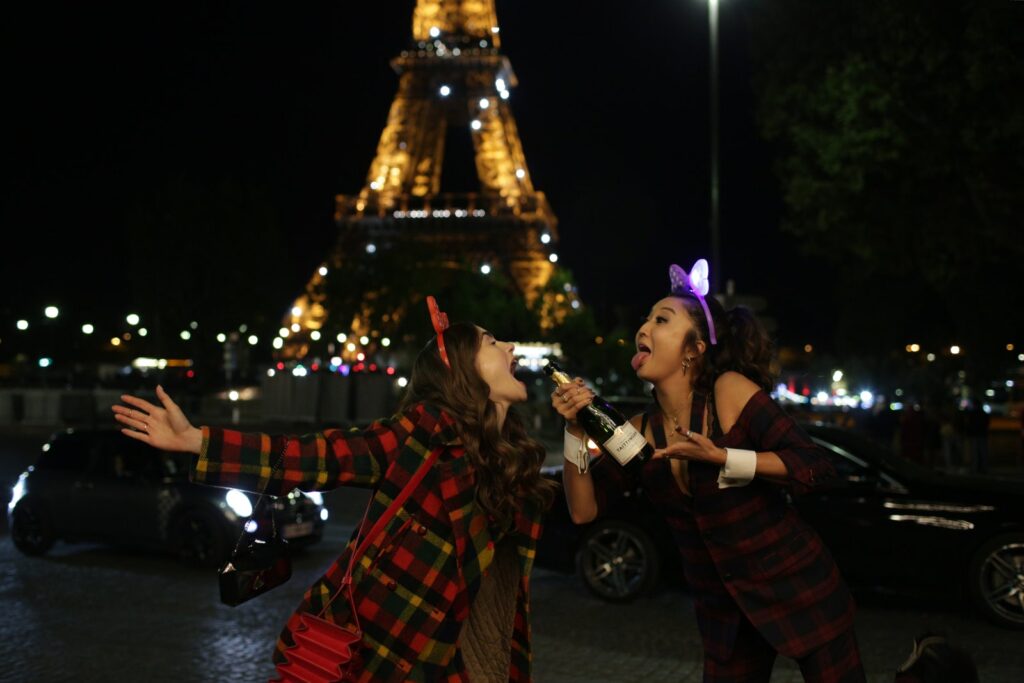By Nicki Bourlioufas
Riding the huge success of Netflix’s Emily in Paris is Champagne Taittinger, with Emily seen all over Paris holding a bottle, whether in front of the Eiffel Tower, on a romantic Paris street, or enjoying the bubbles at one of the many parties she attends.
The placements are a huge win for Taittinger in the very crowded Champagne market and dominated by conglomerate LVMH, with its Moët & Chandon, and Veuve Clicquot, the world’s most recognised Champagne brands.
So how did it all come about, Emily drinking so much Taittinger, a brand still held in family hands?


Claire Sarazin, Communication Project Manager with the Champagne house, says the producers of Emily in Paris approached Taittinger for the placements – to which they happily agreed.
“We discussed directly with the person in charge of accessories, we had a discussion over the phone and Vitalie Taittinger [president of the Champagne house], took the decision to move on. This partnership is entirely based on product placement and we are extremely happy with the results.
“The show is number 1 on Netflix in France at the moment, so finger crossed we get the same opportunity for the second season,” Sarazin says, also pointing to Taittinger’s appearance in HBO’s Succession, based loosely on the Murdoch family.
Emily in Paris‘s popularity in France is reflected globally. As one viewer wrote on the house’s US Facebook page: “Love the show and loved Seeing Taittinger at every turn.🍾🥂”


Indeed, Emily drinks a lot of Champagne throughout the series. And French wine generally. Nevertheless, she wakes up fresh and happy every day, without a bag under her eye or a fierce hangover. Perhaps that’s because she drinks Sancerre in the morning, because it’s a ‘breakfast wine’? Probably not, but that’s a good line for fiction.
Difficult year for Champagne
The placement is a significant win for Taittinger in a difficult year for the Champagne region. Much less of its famous wine is being consumed due to the COVID-19 pandemic. According to some reported estimates, some 100 million bottles of Champagne will be left unsold this year.
The drop in sales follows restrictions on large gatherings in France, such as weddings and other celebrations, leading to less Champagne consumption. That sales drop could worsen. On October 14, France reported 22,591 new coronavirus cases, the third time in six days the daily tally has gone beyond 20,000. President Emmanuel Macron has declared a new public health state of emergency and imposed a nightly curfew from 9pm to 6am on around one third of the country’s population, including on Paris residents and those in big cities Marseille, Lille, Lyon and Toulouse. So it looks like even less Champagne could be consumed in the weeks ahead as nighttime socialising is wound back.
Drought bursts bubbles too
But it’s not just COVID-19 hitting Champagne production and consumption. Severe drought in the Champagne region and over much of France has kept yields down and brought forward the Champagne harvest to the earliest on record. That came after a new temperature record was set in 2019 for the district (42.9°C/109.2°F), and July 2020 was the driest ever recorded, according to the Comité Champagne, the trade association for independent Champagne farmers and producers. According to NASA, the 2019-20 winter in Europe was the warmest on record.
The high levels of sunshine were the cause of very marked grape burns or scalding at Taittinger vineyards. But the drought has also brought some positive points, with very low level of mildew at harvest, helping to preserve the quality of the grapes.
General Manager of Taittinger, Clovis Taittigner, says customers won’t have to wear any price rises as a result of lower production. “Our aim has always been to be loyal, long term and fair towards our clients and customers, and we will try as always to absorb all the damages. It’s is our mentality,” he says.
“There is also the economical context to take into account, with all its consequences.”
Indeed, global recession will likely dent sales of the house’s newly released 2008 Comtes de Champagne Blanc de Blancs. With a price tag close to $400 in Australia and close to €200 in Europe, sales could well be slower this year, with the premium wine market hardest hit by the COVID-19 pandemic.
